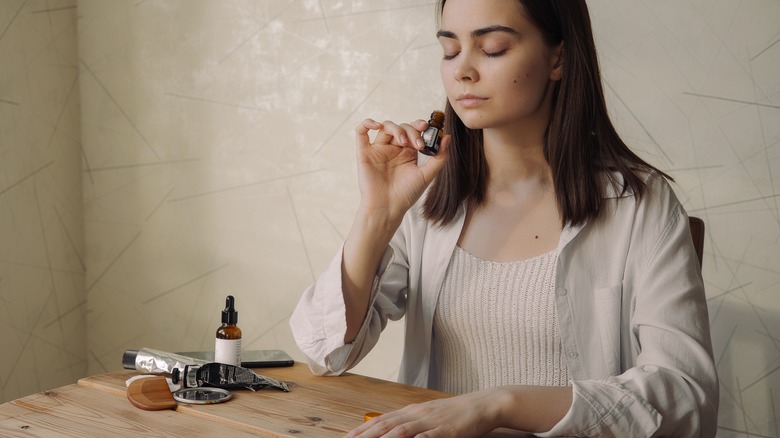Do This With Your Nose To Improve Memory
Most of us don't think much about our brain health until we're standing at the door to our car, wondering why we didn't bring our keys with us. Get enough sleep. Exercise. Avoid stress. Learn a new language. Do some puzzles. These are probably the most common pieces of advice surrounding improving memory we've gotten so far.
But the science behind neurobic exercises tells us that we don't always have to reach for a sudoku puzzle to keep our brains sharp. We can simply employ the help of all five of our senses, together or separately, to boost new neural connections in our brain to improve memory power (via The Healthy). And one of these exercises involves something you can do with your nose: smell new and varied smells.
According to neurobiologist and book author Lawrence C. Katz, changing up the different odors you have come to associate with your regular routine — mornings for the aroma of coffee and nighttime with the scent of your overnight moisturizing cream — can stimulate the formation of different pathways in your brain, which in turn can improve your memory. But how is your nose connected to memory, anyway?
The area responsible for smell is closest to where memory centers lie in your brain
Michael Leon, who led a 2023 study on smell and memory published in Frontiers in Neuroscience, told USA Today that your sense of smell has a "direct superhighway into the memory centers of the brain and consequently has a far greater impact (on memory) than those other senses (sight and sound)."
The small but interesting study involved 43 healthy female and male volunteers, aged between 60 and 85. One half of the participants were exposed to seven different odors (rose, orange, eucalyptus, lemon, peppermint, rosemary, and lavender) broken down to one a week, using an odor diffuser, for two hours every night for four months. The other half had diffusers with no scent. After brain scans and verbal memory tests, the researchers found that the volunteers who were exposed to different scents while they slept performed 226% better on the verbal memory tests and also showed better function in the neural connections related to memory (via USA Today). A 2022 study done on people with dementia saw a similar boost in memory.
Although the exposure to different scents was done while the volunteers slept in the 2023 study, the principle of introducing new smells to your nose to boost brain health can be practiced when you're awake, according to the researchers. Leon shared (via National Public Radio) that we are deprived of new and different smells in general, and brain exercises of this nature can have both short-term and long-term benefits for memory.
How to use your nose to improve memory
If you want to take a leaf out of the 2023 study done by Michael Leon and his teammates, you can go out and buy an odor diffuser and experiment with different smells each night. Just be mindful of your sleep partner (if you have one) and if they enjoy scents in the bedroom or not. It's an easy, non-intrusive, and non-time-consuming way of stimulating your brain to form new neural connections to improve memory.
If you want to try the neurobic exercise while you're awake, you can simply purchase a few different scents — either essential oils, lotions, or scented candles — and introduce them to your nose at different times of the day. The key is to mix things up — for example, replace the usual morning coffee aroma you might associate with waking up with a vanilla scent or introduce some peppermint essential oil to your diffuser while winding down for the night. You can also try closing your eyes and smelling different scents at the end of the week and trying to guess what they are (via The Healthy).
Memory loss isn't only about forgetting to bring a reusable bag with you to Walmart. Neurological conditions like Alzheimer's and mental health conditions like depression can affect your memory too. It won't hurt to incorporate this nose test into your everyday life preemptively as a simple means of keeping your brain sharp.


